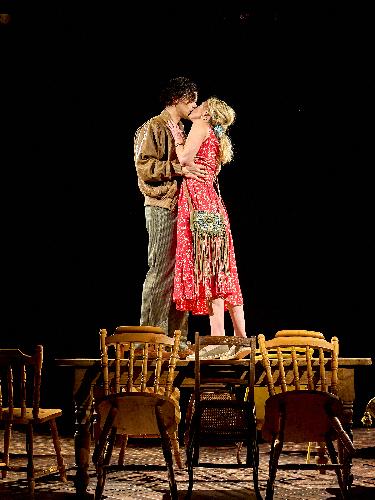When Tom Stoppard’s Rock ’n’ Roll premiered at the Royal Court in 2006, movers and shakers of the decade were out in force. Real live rock'n’roll stars Mick Jagger and Pink Floyd’s David Gilmour were with writers and critics to witness this new political tour de force directed by Trevor Nunn. Brian Cox, Sinead Cusack and Rufus Sewell were at full stretch as they argued about the philosophy of love and the overthrow of Communism in Czechoslovakia.
As Jagger’s presence at that first production testifies, Rock ’n’ Roll focuses on how the huge movements in culture move in tandem: music and politics. Between intellectual arguments on the morality of choice and the duty of dissident Marxists, music from the rock group The Plastic People of the Universe blasts out. Locked up by their Communist Czech government for their non-conformity, this group certainly had something to witness. Or to put it another way, their music was so inspiring to young people, the government feared them too much to let them be free.
In last night’s re-run of this groundbreaking play the lead character, an idealistic PhD student named Jan, insists that our consciousness exists in our bodies, it is the source of our true selves. Jan’s Marxist tutor Max concurs with this sentiment. Max’s wife is dying of cancer. She argues the opposite view, a person’s ‘self’ exists in their soul, not their body. In private, she lets rip with quivering rage torn from the depth of her suffering and sense of the fragility of life. Her passionate speech to Max to love her for her spirit and not her body is incredibly moving, a rebuke to anyone intent on defining people by their looks alone. It cuts through the complicated static debate about consciousness. Suddenly, the stage trembles with the live-wire tension of a couple as they struggle with conflicted - and wildly different outlooks.
He is the intellectual who rationalises that we human beings are purely biological creatures at the mercy of our beliefs dominated by our convictions, forced into character by our grasp of ideas. She is passionately keen to cling to the natural freedoms of being healthy and alive. She is devastated to hear that as her body is cut from her and chemotherapy takes her womb and ovaries, he, her lover and partner appears to love her for her body, the body which day by day loses its energy, sheds its potency and fails her.
This argument may not be the main love story, the caucus of conflict that carries the audience’s attention, but for me, this enduring love and the issues that percolate to the surface is the one that has stayed with me. Are we creatures of intellect only? How much liberty do we have when our bodies decline? How much is love embedded in sex and attraction? All this is part of the tension in this remarkably complex play. It is written from the heart. Tom Stoppard is sometimes little recognised as the forced emigré he was at his core, a citizen of the hopeful Czech régime condemned to alienation elsewhere and full of longing for a better place many felt had arrived in his native Country, only to be dashed and disappointed. In this work, he embodies the dialectic of the time and in it, explores the true nature of love, in all its forms - for a partner, friend, or one’s own country.
It runs until 27 January.
Review: Caiti Grove Photo: Manuel Harlan

